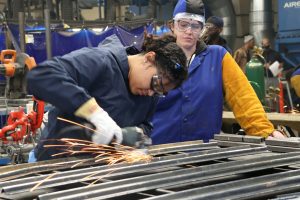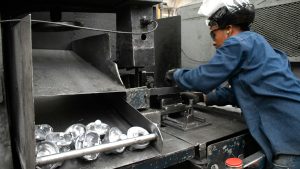Vocational schools in the USA provide students who wish to acquire practical skills and enter the profession rapidly with a career-focused and practical approach. In contrast to traditional universities, which stress academic theory, vocational schools prepare students for specialized skills and occupations like technology, healthcare, construction, culinary arts, and more. Through a combination of classroom instruction and practical experience, these programs are intended to satisfy industry demands. Many people find that vocational education offers a cost-effective, effective, and fulfilling path to secure, in-demand jobs.
Read Also: Casual Jobs in the USA- Everything You Need to Know
10 Best Vocational Schools in the USA
-
 Technical Institute of Lake Area
Technical Institute of Lake Area
offers a wide range of trade specializations in just two years and was recognized with the 2017 Aspen Prize for Community College Excellence. With 98.56% of alumni finding employment or continuing their education after graduating from Lake Area Technical Institute, they can brag a remarkable success record. Automotive, aviation maintenance, building trades, custom paint and fabrication, diesel, electronic systems, energy, environmental, heavy equipment operator, high performance engine machining, precision machining, robotics, and welding technology are among the trades that are offered.
-
Community College of IVY Technology
Private and non-profit with over 40 places throughout the country. Ivy Tech Community College is a member of the North Central Association and has Higher Learning Commission accreditation. With more than 40 locations, they are dedicated to advancing the state’s technical sector and do a fantastic job of offering extensive programs in HVAC, diesel technology, building construction management, electrical engineering technology, and building construction technology. Collegechoice.net ranks its electrical work program as the best in its field. The following trades are available in the school: advanced automation and robotics technology, agriculture, automotive and aviation technology, building construction management, diesel technology, electrical engineering technology, electronics and computer technology, energy technology, HVAC, industrial technology, and machine tool technology.
Pre-engineering, precision agricultural equipment technology, mechanical engineering, mechanical engineering technology, nanotechnology, and manufacturing production and operations.
Read Also: Electrician Trade Schools in the USA
-
Georgia Piedmont Technical College Non-profit, private
According to their vision statement, Georgia Piedmont Technical College is the “oldest and most respected of Georgia’s 22 technical colleges” and has three distinct campuses. According to collegechoice.net, Georgia Piedmont Technical College has the best HVACR curriculum. Under the Industrial Technologies curriculum, they also provide other excellent field service training courses. Trades available include welding and joining technology, commercial refrigeration, building automation systems, automotive technology, and air conditioning technology.
-
East Valley Institute of Technology
Its mission statement centers on developing a skilled labor force to satisfy the demands of business and industry, which are driven by the market. Currently, the industry requires more trained personnel in plumbing, HVAC, and electrical work. Trade specializations are their main focus, and they have three locations throughout Arizona. Welding, Precision Machining & Manufacturing Technology, Solar Maintenance & Installation Technician-PV, Industrial Trades Academy & GED program, Automotive Restoration, Collision Repair, Cosmetology, George Brazil School of Plumbing Service & Repair Technician, and HVAC.
-
College of Austin Community
Over 70,000 students attend Austin Community College each year, including those who enroll online. Many have enrolled in one of the more than 100 specialized programs offered by the school, including one in HVAC that is rated as one of the best by collegechoice.net. Welding technology, building construction technology, electronics and advanced technologies, geographic information systems, HVACR, automotive technology and outdoor powered equipment, automotive collision repair and refinishing technology, architectural and engineering computer-aided design, and land surveying and geomatics
-
 Training Center for Employment
Training Center for Employment
CET focuses on enhancing your current abilities and knowledge to provide you with a discernible income and opportunity differential. In each of their programs, the average salary of graduates is listed, along with the precise benefits that students can expect. Construction and Building Maintenance is their most popular program, and they also provide a Green Building Construction Skills program that focuses on more contemporary building technology. Welding fabrication, machinist technology, HVAC green technology, green building construction skills, maintenance and construction, cleaning service and maintenance technician, and electrician.
-
Triangle Technology, Inc.
Triangle Tech Inc. is a construction trades-focused school with seven campuses throughout Pennsylvania, and they also provide a wide range of other programs. This globally known technical school was included in Forbes Magazine’s ranking of the Top 30 Two-Year Trade Schools. CADD in conjunction with 3D printing and additive manufacturing, HVACR, maintenance, electrical, and construction technology, carpentry, and welding and fabrication technology.
-
College of Western Wyoming Community
The institution at Western Wyoming Community College takes pride in its ability to adapt to the needs of the market and student input. The Academic Quality Improvement Program includes them, and they offer a variety of options for locating your ideal career. Trades that are offered include welding, natural gas compression, oil and gas, diesel, electrical, industrial, mining, and car maintenance technologies.
-
Central New Community College
Central New Mexico Community College offers a wide range of technical work options with its 80+ specialized areas of study, which include welding, machine tool technology, HVACR, construction management technologies, diesel equipment technology, electrical trades, plumbing and gas fitting, and carpentry. Their program for electrical trades is especially noteworthy; according to collegechoice.net, it is among the top three of its kind. Construction management technology, automotive technology, aviation technology, carpentry, diesel equipment technology, electrical trades, emerging applications in applied technologies, film technician, geographic information technology, HVACR, machine tool technology, plumbing and gas fitting, pre-architecture, rapid prototyping & innovative design, surveying technology, truck driving, unmanned aircraft systems, welding, and architectural/engineering draughting technology are among the trades off.
-
Ferris State University
Ferris State University has partnered with 20 other places to broaden its reach, even though its main campus is still located in Big Rapids, Michigan. Although they have 190 other career opportunities, including several branches of the field service business with their Engineering Technology course of study, I selected them on this list because of their exceptionally strong HVAC program. Architectural, automotive, building construction, CAD draughting and tool design, civil engineering, heavy equipment, HVACR, industrial electronics, manufacturing, mechanical engineering, plastics and polymer engineering, surveying, and welding technologies are among the trades that are available.
Read Also: Best Trade Schools in the USA
Top Benefits of Vocational Schools in the USA
 Trade Schools Provide More Practical Instruction. A typical four-year institution does not require students to study their chosen field for four years. Universities place a greater emphasis on teaching students general knowledge and skills through a well-rounded liberal arts program. The issue is that, to fulfill your credit requirements, you wind up taking pointless and occasionally absurd classes like frisbee golf and pottery-making on top of your vocational training. Vocational training schools only teach the skills you need to do your job. You acquire the practical talents you’ll need daily for your job instead of less specialized ones.
Trade Schools Provide More Practical Instruction. A typical four-year institution does not require students to study their chosen field for four years. Universities place a greater emphasis on teaching students general knowledge and skills through a well-rounded liberal arts program. The issue is that, to fulfill your credit requirements, you wind up taking pointless and occasionally absurd classes like frisbee golf and pottery-making on top of your vocational training. Vocational training schools only teach the skills you need to do your job. You acquire the practical talents you’ll need daily for your job instead of less specialized ones.
-
Flexible Schedule Classes
Conventional colleges are designed for full-time students who have recently completed high school and are aiming to finish their education before starting a career. Many of them provide significantly fewer course alternatives for students who wish to complete their education in the evenings while working a 9–5 job. Because they serve a larger range of pupils, vocational training schools offer a greater variety of alternatives. The majority of programs include online, part-time, or flexible full-time schedules so that students can accommodate their family obligations or job schedules.
-
Trade Schools Provide Practical Experience
Conventional universities prioritize academic knowledge above practical, hands-on instruction. For some occupations, such as engineering, such kind of expertise is excellent. Nevertheless, a lot of university students only receive background information, so they will need to pick up new skills on the job. Conversely, there is a better mix between foundational knowledge and practical training at vocational training schools. Whether you work in information technology, holistic healthcare, or another sector, you’re probably more equipped to handle the day-to-day responsibilities of your job than someone whose degree has placed a greater emphasis on theoretical knowledge.
-
Personalized Attention from Skilled Teachers
You will receive instruction from seasoned professionals who work as trainers and mentors in vocational education programs. Vocational training schools typically offer lower faculty-to-student ratios than traditional institutions, allowing each student to get direct supervision and mentoring. However, every school is different. There won’t be any big lecture halls where 200 other students may overshadow your demands. Your teachers are experts in their fields, ready to help you succeed overall in addition to teaching you specialized methods and abilities. They are also in a good position to offer networking and internship possibilities because they are involved in the sector.
-
Education at a Reduced Price or Return on Investment
Vocational School is an investment in your career and personal development that takes both time and money. A 2002 study by the U.S. Department of Education called the “National Assessment of Vocational Education” found that students who enroll in vocational programs experience greater employment rates, higher incomes, and higher levels of job satisfaction. Many students anticipate incurring some debt as a result of their educational investments.
However, you will have a significant obstacle to overcome when you begin your profession after graduating from a four-year university with debt of over $100,000. Conversely, trade schools are far more affordable. In addition to the fact that you are often paying for two years rather than four or more, the annual cost is frequently less than that of traditional universities. Additionally, ICOHS College provides military financing options in addition to financial aid. As a result, you can take advantage of your increased earning potential sooner and begin your career with far less debt.
-
Obtaining accreditation
Accredited vocational schools use an independent accreditation process to show that they are dedicated to upholding high standards. Vocational schools are mostly accredited by the Accrediting Council for Continuing Education and Training (ACCET). To demonstrate their dedication to excellence, vocational programs may receive extra certifications and approvals. For instance, ICOHS College has received approval from the California Bureau for Private Post-Secondary Education (BPPE), the U.S. Department of Education, and the U.S. Department of Veteran Affairs in addition to ACCET’s accreditation.
Furthermore, certain professional programs at a vocational school could offer extra certificates, such the Cisco Certification for IT specializations or the American Massage Therapy Association certification. Certifications, approvals, and accreditations are more than just official documents. They reassure the public that a vocational school is dedicated to excellence, progress, and peer responsibility. They might also lead to new financing sources or professional licensing options.
-
Practicums and Interns
To help students thrive, vocational programs understand that practical training in a “real-world” setting is crucial. Traditional classroom instruction and extensive hands-on work in learning labs are the usual methods used to provide vocational courses. Reputable schools establish connections with company executives and local businesses to give paid opportunities, course credit, internships, and practicums. When applying for future jobs, these opportunities help you hone your talents further and add references and work history to your resume.
-
Achieving a Successful Job Placement
Vocational schools’ main goals include career counseling and job placement. The career services center at the school may assist you with networking. They can provide job postings, resume preparation, and interview techniques to help you start your career. Study groups, tutoring, and practice with professional licensure tests in many fields can assist students. Career assistance services are provided by certain programs, not just at graduation but also during your professional life.
-
Simpler Route to Lucrative Careers
The idea that regular colleges offer more lucrative professions than trade schools is among the most widespread misconceptions. The reality is that both forms of schooling provide access to a variety of lucrative employment paths. Your job path—rather than your degree—determines your pay level. Consider the IT industry. Over $88,000 annually is the median wage for the IT industry. This holds whether you have a four-year degree or a certification from a vocational school. Thus, attending a vocational school is a more effective method to start down the same prosperous professional path.
-
Expanding Sectors
Vocational education serves several of the fastest-growing occupations, according to the U.S. Bureau of Labor Statistics. The need for trained individuals in basic infrastructure and service jobs, such as healthcare, electricity, construction, and vehicle repair, has also been highlighted by the COVID-19 pandemic. Employers are having difficulty filling jobs in the manufacturing, healthcare, and technical sectors, so demand is still growing. In these sectors, skilled workers are essential to the nation’s economic development. The most effective way to get them into the workforce is through vocational training.
-
Quicker Career Launch
Traditional colleges last for four years, which is a long time. It takes a long time to either balance part-time schooling with a full-time job or to be out of the workforce by going to college full-time. Conversely, programs at vocational training institutions are more targeted. The majority of trade school programs are completed in less than two years. However, the exact duration may depend on the certification or degree you select. Certain training programs can finish in six to nine months. This depends on the program’s prerequisites and flexible scheduling possibilities. The most short- and long-term gains in employability and income are made by students who finish their degree and any necessary certifications.
Read Also: Visa Sponsorship Jobs in USA for foreigners
Conclusion
Vocational schools in the USA offer a useful substitute for a regular college education by emphasizing real-world training and practical skills. They provide access to fulfilling jobs in constantly sought-after industries, such as technology, healthcare, skilled trades, and the creative sector. Students can begin working and earning money more quickly. This is because vocational schools have shorter curricula, reasonable tuition, and practical experience. A wise and dependable route to a bright future is vocational education. This is regardless of whether you are a recent high school graduate or someone wishing to change careers.
